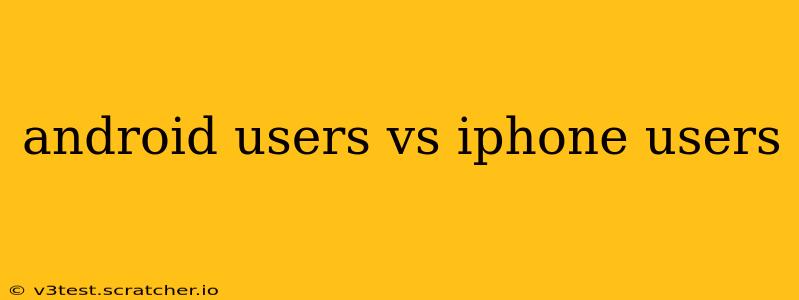Android Users vs. iPhone Users: A Deep Dive into the Smartphone Divide
The age-old debate: Android vs. iPhone. For years, these two operating systems have dominated the smartphone market, each boasting a fiercely loyal fanbase. But what truly separates these two giants, and which one reigns supreme? The answer, as we'll explore, isn't a simple one, and depends heavily on individual priorities and preferences. This comprehensive analysis will delve into the key differences, addressing common questions and misconceptions surrounding Android and iOS users.
What are the main differences between Android and iPhone users?
This question gets to the heart of the matter. The differences aren't just about the operating systems themselves; they extend to the user experience, the types of apps available, and even the perceived social demographics associated with each. Android users often value customization and openness, enjoying the ability to tweak their phones extensively. They tend to appreciate a wider range of hardware options at varying price points. iPhone users, on the other hand, often prioritize simplicity, a seamless user experience, and a strong emphasis on the brand's ecosystem. They often appreciate the perceived higher level of security and the ease of use associated with iOS. Ultimately, the "better" OS is subjective and depends on individual needs and priorities.
What is the typical Android user like?
The stereotype of the typical Android user paints a picture of someone tech-savvy, perhaps even a bit of a tinkerer. They are often drawn to the flexibility and freedom offered by the Android platform, enjoying the possibility of rooting their phones, installing custom ROMs, and generally pushing the boundaries of customization. They may be more price-conscious, seeking a balance between performance and cost. However, it's crucial to remember this is a generalization; Android users represent a hugely diverse group with varying levels of technical expertise and budget considerations.
What is the typical iPhone user like?
The typical iPhone user is often portrayed as someone who values simplicity, elegance, and a seamless user experience. They may prioritize brand loyalty, appreciating the cohesive ecosystem that Apple offers, from iPhones and iPads to Macs and Apple Watches. They might be less concerned about customization options and more interested in a user-friendly interface and strong security. Similar to the Android user stereotype, this is a broad generalization, and iPhone users come from all walks of life and tech proficiency levels.
What are the pros and cons of Android?
Pros:
- Customization: Extensive customization options allow users to personalize their phones to a high degree.
- Open Source: The open-source nature of Android allows for greater flexibility and development.
- Variety: A wide range of devices at various price points are available, catering to diverse budgets.
- Google Services Integration: Deep integration with Google services offers a seamless experience for Google users.
Cons:
- Fragmentation: The wide range of devices can lead to inconsistencies in software updates and performance.
- Security Concerns: While security has improved greatly, the open nature of Android can present potential vulnerabilities.
- Bloatware: Some pre-installed apps on certain Android devices can consume storage and resources.
What are the pros and cons of iPhone?
Pros:
- Simplicity: iOS is known for its user-friendly and intuitive interface.
- Security: iOS generally boasts stronger security features compared to Android.
- Ecosystem: Apple's ecosystem offers seamless integration between various devices.
- App Store Quality: The App Store has rigorous review processes, ensuring higher quality and security for apps.
Cons:
- Limited Customization: Customization options are significantly less extensive compared to Android.
- Higher Price Point: iPhones generally sit at a higher price point than comparable Android devices.
- Less Flexibility: Users have less control over the operating system's functionalities.
- Repairs Can Be Expensive: Repairing iPhones can be costly, particularly outside of official Apple services.
Which phone is better for gaming?
The "better" phone for gaming depends on the specific game and individual preferences. High-end Android phones and iPhones both offer powerful processors capable of handling demanding games. However, Android’s larger screen sizes on some models might be preferred by some gamers. Ultimately, individual benchmarks and reviews of specific phone models should be consulted for the most accurate comparison.
Which phone has better battery life?
Battery life varies greatly across models, both for Android and iPhone devices. There's no definitive winner, as newer models from both manufacturers regularly push the boundaries of battery technology. Checking individual phone specifications and user reviews is crucial for an accurate assessment.
In conclusion, the Android vs. iPhone debate is ultimately a matter of personal preference. Both operating systems offer compelling features, and the best choice depends entirely on individual needs, priorities, and budget. This detailed comparison provides a clearer understanding of the key differences, empowering users to make informed decisions based on their specific requirements.
